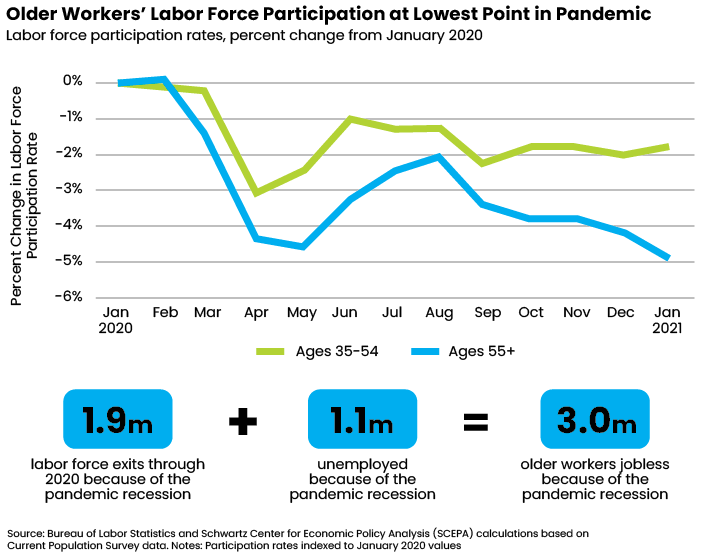Three million older workers (age 55-plus) lack jobs because of the pandemic-induced recession and their labor participation rate — the share who are employed or looking for work — is at its lowest point since the recession began, according to the latest research from the New School’s Schwartz Center for Economic Policy Analysis (SCEPA).
Since January 2020, 1.9 million older workers have exited the workforce and 1.1 million are unemployed because of the recession. The population of older Americans not in the workforce grew at three times its normal rate between January 2020 and January 2021. In addition to job loss, many older workers exited the labor market because of the health risks associated with COVID-19.
The 3 million lost jobs is a bigger concern than many realize, researchers with SCEPA’s Retirement Equity Lab explained in their February 2021 “Status of Older Workers” report and during their recent webinar. Older workers have slipped backwards more than mid-career workers (age 35 to 54) as the labor market recovery has stalled; they’re likely to have a much harder time getting back into the workforce; and they’re at high risk of early, involuntary retirement that can impact their retirement security.
The jobs picture started to brighten last summer for older workers — 1.0 million returned to the labor force between last May and August as the economy started to reopen from the initial pandemic lockdowns. But the gains older workers experienced took a dramatic reversal as the labor market recovery stalled.
Between August 2020 and January 2021, 1.1 million older workers left the workforce and their labor participation rate has continuously declined. As with past recessions, the decline has been more severe for non-white older workers, said the SCEPA researchers.

But here’s a striking difference. For most of this recession, unemployment rates have been higher for older workers than for mid-career workers — a pattern not seen in 50 years, said the researchers. The labor participation rate of mid-career workers increased between last September and October and then pretty much leveled out through January.
Although the unemployment rate for older workers (which hit 13.6% last April) fell from 6.0% in December to 5.3% in January, the decline came from people dropping out of the labor force and not because they landed jobs, the SCEPA researchers noted.
Even when the COVID-19 vaccinations start to bring the pandemic under control, which will help jumpstart an economic recovery and enable people to return to the workforce, “older workers will have a deeper hole to dig out of than they did in say the summer of 2020 or early fall,” Owen Davis, a research associate at SCEPA and a co-author of the older workers status report, said during the webinar.
Older workers are disadvantaged by age discrimination, he said, and non-white workers also face racial discrimination and structural barriers. Older workers who left the labor force face greater obstacles when returning than those who did not drop out, he added.
Prior research shows that when older workers exit the workforce, it increases the risk of early and involuntary retirement, said Davis, and longer spells of joblessness increase the risk of drawing down IRAs and 401(k)s, and sacrificing some well-being in retirement.
“It’s really the end of the line for these workers if they don’t get back into the labor force,” labor economist Theresa Guilarducci, a professor of economics and policy at the New School and a co-author of the report, said during the webinar. “We really have a big retirement crisis on our hands” and the latest numbers accelerate that.
She and her colleagues included a number of policy suggestions in their report that they believe could help improve the employment situation for older workers and protect their retirement security. Topping their list is speeding up vaccine eligibility for older workers in their 50s and early 60s and offering workplace protections.
They’d also like to see unemployment benefits extended and increased, which they say could help older workers avoid dipping into their retirement savings and claiming Social Security too early. They think Congress should suspend the job-search requirement for unemployment eligibility for older workers while risks from COVID-19 remain high.
Guilarducci and her co-authors suggest lowering Medicare eligibility to age 50 and making Medicare the “first payer,” before employer-provided insurance, in order to lower the cost of hiring older workers. They’d also like the U.S. Department of Labor to establish an Older Workers Bureau to create standards and policies to promote the welfare of older workers and advance their opportunities for profitable employment.
Jerilyn Klein is editorial director of Rethinking65.







